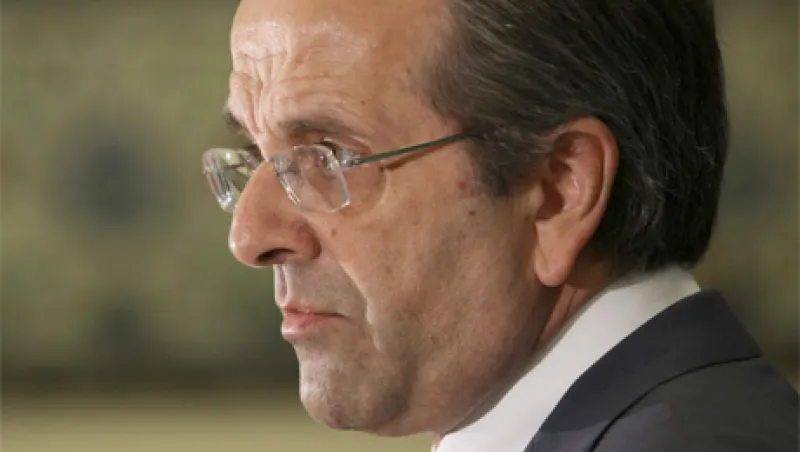Sunday’s election left the Greeks sullen, the eurocrats anxious, and the markets mildly relieved. Most indicators rose on Monday’s opening, the euro up 0.6 percent and equity markets up a tick, as traders’ attention moved on from the Greek crisis to the next macro imponderable — meaning China GDP growth rate, for most. But they are mistaken if they think that the Grexit risk factor is off the table.
Here’s why. The Greeks and the Northern Europeans (read, the Germans) both think they have a stronger hand than they actually do. In diplomacy this is the recipe for a train wreck.
The Greeks believe the Germans fear the negative fallout on the euro zone if the Greeks exit messily, more than the Germans fear the morale hazard example of letting the Greeks default on the terms of multiple bailouts to date. Both of the Greek parties that came in on top on Sunday’s vote count, the No. 1 New Democrats and the No. 2 Syriza, are convinced that the Germans will let them walk away from the latest bailout. I’ve been listening to the leaders of the two largest parties describe how the bailout Memorandum of Understanding with the European Union, European Central Bank and IMF Troika needs to be “redone” (The New Democrats) and “ripped up” (Syriza) — claiming in the same breathe that Greece must remain within the euro zone.
Viewed from Berlin, the Germans believe the Greeks must understand that crisis and chaos is just around the corner if they default on the Memorandum. Not willing to be fooled a second time, the Troika has kept the Greeks on a very short tether. If the MoU gets ripped up, the cash stops flowing. Faced with the very real prospect that in weeks government salaries will go unpaid and the lights will actually go out, Greek politicians, no matter how feckless, will honor the MoU. Campaign rhetoric is one thing, but action is another, the Germans are saying to each other. No politician wants to be responsible for breaking up The European Project, but 70 percent of the German public thinks the Greeks should go.
As I write this, the New Democrat’s leader Antonis Samaras is across town feverishly trying to cobble together a coalition government. New Democracy came in first with 29.6 percent of the vote and 129 of the 300 seats in Parliament, Syriza got 26.9 percent and 71 seats, while the Socialist Pasok continued to implode, running third with 12.3 percent of the vote and 33 seats. Samaras will certainly have some awkward bedfellows, drawn from Pasok or a smaller party. And then armed with this dubious mandate, he will have to go face the European music at a Brussels Summit in just two weeks. Angela Merkel, just back from the G-20 Summit in Los Cabos, Mexico, where a chorus of almost ever leadery, including Barack Obama and François Hollande, is singing a “growth not austerity” tune, is unlikely to be in a good mood.
Judging by the shrieks and cheers in Athen’s bars on Saturday night, the average Greek was much more thrilled by their underdog soccer team’s 1-0 victory over the Russians than by the muddled election results. They were dancing in the streets until dawn. But the mood in the cafes and bars on Sunday evening, which in Athens starts around 9:00 p.m. and lasts until the wee hours, was distinctly downbeat.
“You may not be interested in war,” quipped Commissar Leon Trotsky to some nervous peacenik supporters of the Russian Revolution in 1917, “but war is interested in you.” You may not be particularly interested in the fault lines underlying June 17th’s Greek election, but the high stakes stand-off between Athens and Brussels is probably interested in you — or at least in your trading position.
Rarely has a political intrigue in a peripheral country shaken financial markets as has Greece in the run-up to Sunday’s election. No one, including the Greeks themselves, is entirely sure why. Everyone realizes that they constitute at most 2 percent of the euro zone GDP. And everybody knows that Greek banks and government alike have been out of European financial markets for months. They both survive at the end of a thin financial lifeline from the European Central Bank’s so-called Emergency Lending Facility and its associated interbank clearing system, the Target1 accounts that provide Greek banks with euros. Authorities at the ECB, the Bank of England and even the Federal Reserve nervously claim that a Greek exit from the euro zone, however ugly, will not rock the global money market.
A bit dubious of that assertion, I’ve been in Athens for a week kicking the tires, one eye on the financial markets and the other on the electoral campaign. As I strolled down the elegant boulevards towards Constitution Square on Saturday’s warm evening, I noticed small queues in front of the ATMs, dispensing euros to anxious Greeks and tourists alike. No one knew if the ATMs would be working on Monday. “If we spend this here we’re part of the solution,” said one colleague. “But if we take it with us on Monday, we’re part of the capital flight problem.”
But the ambience in Athen’s hundreds of cafes has none of the anxiety of pending chaos that some of the foreign news media breathlessly portrayed. This is no city under siege. Unlike, say, Damascus or Kabul, the police presence was minimal. Most obvious were the riot cops in blue uniforms and helmets, riding two on a bike in pairs downtown. By the second day I realized they were more interested in chatting up the foreign tourist chicks than in cracking heads.
Turnout was fairly high but the tone was subdued at the polling places. I visited one late Sunday afternoon in the Plaka neighborhood, a middle school on Mitsaion Street almost within the shadows of the elegant new Acropolis Museum, as voters drifted in and out in two and threes. “Yes, we Greeks have many elections,” quipped a dapper older gentlemen with a fedora and a wry smile. “Since we have no money, this is our entertainment.”
Alexis Tsipra’s young Syriza supporters are definitely entertained. A 20-something in a tube top, bright red star tattoo on her neck and a Syriza armband was quietly but earnestly persuading older voters in the schoolyard. I doubt she was much interested in capital markets. As the Syriza website proclaimed, “Capitalist speculation is an inhuman organizational principle for modern society. We are endorsing a new model for the production and distribution of wealth. The large capitalist property is to be made public and managed democratically along social and ecological criteria. For Greece and for Europe, the solution is with the Left!”
Not surprisingly, nervous eurocrats are very interested in Syriza. All week, analysts from Tokyo to New York carefully parsed the campaign rhetoric of Tsipras and his campaign spokesmen for any signs of how the 37-year old former student radical would actually govern if he obtained a mandate on June 17th. A year ago they were a minor radical party in the Greek parliament, with eight members, more or less. On Saturday they had even-on odds to take over the government.
It was very hard to get a read on their likely economic and financial policy. Nobody knew who would be finance minister; the bench of experienced figures was surprisingly thin. If his party won enough seats to form a coalition government, engineer-turned-student-radical Tsipras and his earnest colleagues would have to metamorph from outsider firebrands to responsible insiders in a very short period of time. No wonder news pundits dubbed Greece’s next prime minister as “The Hardest Job in Europe.”
But their persistent campaign tropes of fiscal reform, anticorruption and transparency made a lot of sense to Greek voters (and me), as did their promise to get Greece back on a growth versus austerity path. The numbers were apparent to anyone who had a calculator and a passing grade in Economics 101. Greece’s current debt burden is simply too high to grow out of. The Memorandum gave them until 2020 to reduce the debt burden from 160 percent down to 120 percent. I have yet to find anyone who finds that remotely credible.
The two “centrist” parties of Pasok (Pan-Hellenic Socialist Movement) and New Democracy had alternated in power and vied with each other to botch the Greek economy for decades. They were utterly discredited in the eyes of the European Union and the Greek man in the street, the original demos, alike.
The two-party coalition had negotiated a Memorandum of Understanding with the Troika that committed Greece to almost endless economic contraction. Each quarter the Greeks missed their targets of fiscal surplus, while lagging on every front of structural reform. There was no privatization of state-owned enterprises, few lay-offs of the bloated government bureaucracy, no retrenching of the lavish pension promises, almost no structural reforms to promote competition and investment in industrial sectors.
The Northern Europeans have been quietly seething for months. Germany’s Finance Minister Wolfgang Schauble couldn’t contain himself, blurting out a thinly veiled threat on Friday. “If Greek voters were to vote for a majority that does not honor those agreements,” he said, “ then Greece will have to bear the consequences of that. EU membership is voluntary.”
Despite all the fiscal handouts, Greeks do not trust their government. And so they do not pay their taxes. Fiscal revenues continue to drop as Greeks hide their current income and permanent assets. An attempt by Pasok in 2011 to piggy-back new taxes on the electricity bill of private residences only resulted in mass nonpayment of utility bills: Delinquent bills from customers doubled in a year. This in turn brought the Public Power Corporation (PPC’s) national electricity grid to its knees in terms of unpaid receivables to DEPA (Dimosia Epichirisi Paroxis Aeriou) the national gas supplier, which in turn was prostrate before its suppliers, including Iran’s oil company and Russia’s Gazprom.
Iran’s national oil company began to restrict shipments to the Hellenic Oil Company in April, for nonpayment. You know you’re in trouble when the Iranians cut you off, when everyone else in the world is cutting off the Iranians as suppliers. Then in May, with an unpaid receivable north of 100 million euros, Gazprom was threatening to cut off the gas flow by the end of the month. While some Greeks anxiously eyed the ATMs for the first sign of a systemic breakdown, others were eyeing their stoves and air-conditioners. As one cafe conversation put it, “OK, so if the airlines can’t buy fuel and get us out of here next week, how much does it cost to get a ferry to Italy?” (The answer is 140 euros from Patra to Bari.)
But there was no apocalypse Monday. I withdrew some more euros from the ATMs on Kolonaki Square. Lufthansa emailed me confirming my flight back to New York tomorrow. The Mediterranean sun is shining hot and dry, a nice breeze is blowing in from the wine-dark Aegean, the cafes are full and the tourists are trudging up to the Acropolis in droves.
And foreign statesman are making statesmanlike noises. Finance Minister Schaeuble called New Democracy’s victory a decision to “forge ahead” with implementing far-reaching reforms, while Foreign Minister Guido Westerwelle said, “there cannot be substantial changes to the agreements, but I can well imagine talking again about timelines, against the background of the fact that, in reality, there was a political standstill in Greece over recent weeks because of the elections.”
As night falls, the sound of Euro rave music is lifting up from around Kolonaki. Until last night we heard a very different tune.
At its rallies all week New Democracy has been loudly playing the theme song from Pirates of the Caribbean. Samaras bears little resemblance to Captain Jack Sparrow, and exuberant facial hair is more common among Syriza supporters than the New Democrats. The irony of using a Disney movie tune written by German composer Klaus Bedelt probably occurred to few.
Over at the Syriza rallies the speakers were blaring Patti Smith’s 1993 disco hit “Power to the People.” The kids were cheering to the lyrics that struck me as quaintly retro:
“The power to dream / the power to rule
To wrestle the world from fools
It’s decreed the people rule
It’s decreed the people rule [boom, boom, boom]
Power to the People!”
Politics and entertainment have been intertwined for a long time here in the birthplace of democracy. Grexit risk may have faded from the immediate mindset of market traders, but it is loud and real this week in Athens. And in just four days, the Greeks will face off against the Germans in the European Cup Quarter Final — what sports pundits call “the ultimate grudge match.” Soccer-mad traders may find themselves looking at two screens, one broadcasting Friday’s match live from the stadium in Gdansk and the other charting the eurodollar market. Watch this space. As early as Friday evening, or as late as 3 months from now, we will be looking at Grexit risk again.
James Shinn (jshinn@princeton.edu) is a lecturer at Princeton University’s School of Engineering and Applied Science. After careers on Wall Street and in Silicon Valley, he served as the national intelligence officer for East Asia at the Central Intelligence Agency and then as assistant secretary of defense for Asia at the Pentagon. He serves on the advisory boards of Oxford Analytica and CQS, a London-based hedge fund.






